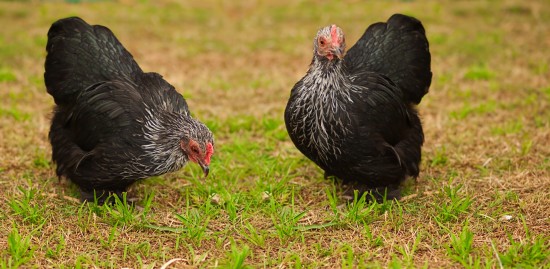

A lot of people start off keeping a couple of chickens but as time passes by their flock tends to grow along with their feed bills and although hens are pretty good at scratching around in the dirt for food unless they can find enough to eat they still need to be given daily rations of mixed corn, pellets or mash to keep them happy and healthy. However, there are ways of keeping a feed bill down so that it doesn't put pressure on your finances and which allows you to keep your flock in great condition.
If you can free-range your chickens, the cheaper it is to keep them simply because as mentioned above, chickens can find lots to eat by scratching around in the dirt. You would still need to feed your birds and if necessary supplement their diet with the right minerals and vitamins which is especially true if you don't have a lot of land.
The other thing you need to bear in mind is that some breeds are better at foraging for themselves than others who tend to wait by their feeders waiting to be fed, so it really does depend on what type of hens you keep as to how much you would be able to reduce a feed bill by free ranging them.
You need to have enough ground to keep your hens on and naturally, the area has to be safe and secure from predators. The problem is that chickens just love scavenging for food and bugs in bushes, woodlands and other areas where foxes and other predators can easily get at them because typically these are these are the areas that are much harder to fence off as securely as they should be.
With this said if a small paddock is well maintained and regularly seeded to attract loads of bugs, your hens will be very happy. The only thing you have to watch out for are aerial predators in the form of large birds of prey! Bantams and smaller breeds tend to be better at free ranging than heavier breeds and if you want to keep a feed bill as low as possible, smaller breeds will eat on average seven times less than heavier birds.
Another great way of reducing a feed bill is to mix up your own food for your birds but to do this correctly, you would need to know their exact nutritional needs which you can find out about online. Buying all the ingredients in bulk and then mixing them together works out far less expensive than buying ready mixed poultry feed.
The beauty of mixing the feed yourself is that you can add more corn when needed during the colder winter months and reduce the amount of corn in the mix when the weather is warmer during the spring and summer months. It also allows you to mix in grains which are not normally added to premixed poultry feeds.
Keep chickens tends to means you never have a problem with getting rid of any kitchen scraps and in particular fruit and vegetables. The reason being that your hens will adore feasting on anything that you have left over as long as it is safe for them to eat that is.
Any vegetables you give your hens will supply them with much needed roughage adding lots of healthy fibre to their diet. You will soon find out what they like and what they don't like which makes it easy to sort out what you can give them in the way of kitchen scraps and what you would need to throw away.
This particular method of feeding chickens was created by Jim Worthington and it consists of feeding your birds lots and lots of vegetables which means you won't have to buy as much poultry feed. The diet also includes feeding a flock whole grains and in particular wheat. It's high in protein in the form of fish meal but if you cannot source fish meal there are alternatives that can be used which includes the following:
You can also add meat to their diet as long as it is not poultry but the best source of valuable protein and omega 3 oils comes in the form of fresh fish heads and guts which you can boil up and then feed to your hens when cold.
However, if you have never fed your hens any of the above, they might not eat it to begin with simply because they were not fed this type of grain when they were young. However, given a little time and by mixing a small amount in with their usual feed they will soon start to get a taste for the new grains which means you can slowly reduce the amount of bought in premixed poultry feed and as such reduce you bill.
Another poultry diet that was developed by Lady Eve Balfour, which is another great way of reducing a feed bill and getting rid of kitchen scraps at the same time is called the Balfour method of feeding poultry. The way this works is to create a compost heap that becomes a chicken run for your hens. Everything gets chucked on the compost pile and this includes kitchen scraps in the form of vegetable matter, waste from the garden, old hay, straw, grass clippings, leaves and anything else that you would normally put on your compost heap or in a compost bin.
The compost heap needs to be enclosed just as you would a normal chicken run, and your hens will spend their entire day scratching around to find everything they need to stay happy, full and healthy. Bug are automatically attracted to the compost heap which your hens will devour and which are a good source of valuable protein for them.
Ideally, you should have two "compost runs" for your hens to scratch around on with a gate separating the two areas so they can graze them alternatively. You would need to create your "compost pens" on a nice grassy bed that's rich in clover and other grasses that chickens love to eat – namely chickweed. Letting them out every day to scratch around on them will keep your birds well fed and very busy.
Each compost pen should be used for a maximum of 3 weeks before moving them on to the second pen like this neither run will become "spoiled" by over grazing and scratching. You would also need to completely clean out each area at least twice a year which ideally should be done in the spring and then again in the autumn.
 How To Make A Claim On Your Pet Insurance
How To Make A Cla
How To Make A Claim On Your Pet Insurance
How To Make A Cla
 Reasons Why You Should Choose A Large Breed Dog Bed
Reasons Why You Should Choose A Large Breed Dog Bed
Reasons Why You Should Choose A Large Breed Dog Bed
Reasons Why You Should Choose A Large Breed Dog Bed
 The Importance and Styles of Chicken Houses for Chickens
The Importance and Styles of Chicken Houses for Chickens
The Importance and Styles of Chicken Houses for Chickens
The Importance and Styles of Chicken Houses for Chickens
 Ten Types Of Allergies That Can Affect Dogs
Ten Types Of Alle
Ten Types Of Allergies That Can Affect Dogs
Ten Types Of Alle
 How To Deal With Bee & Wasp Stings In Dogs
How To Deal With
How To Deal With Bee & Wasp Stings In Dogs
How To Deal With
Copyright © 2005-2016 Pet Information All Rights Reserved
Contact us: www162date@outlook.com